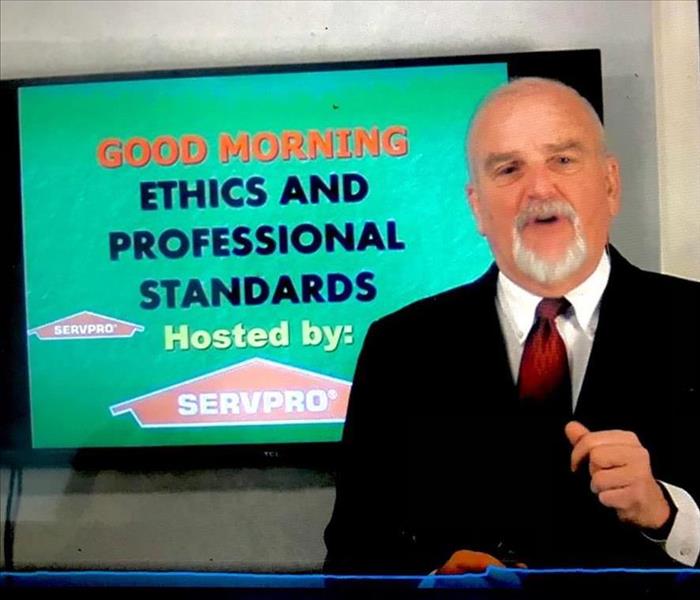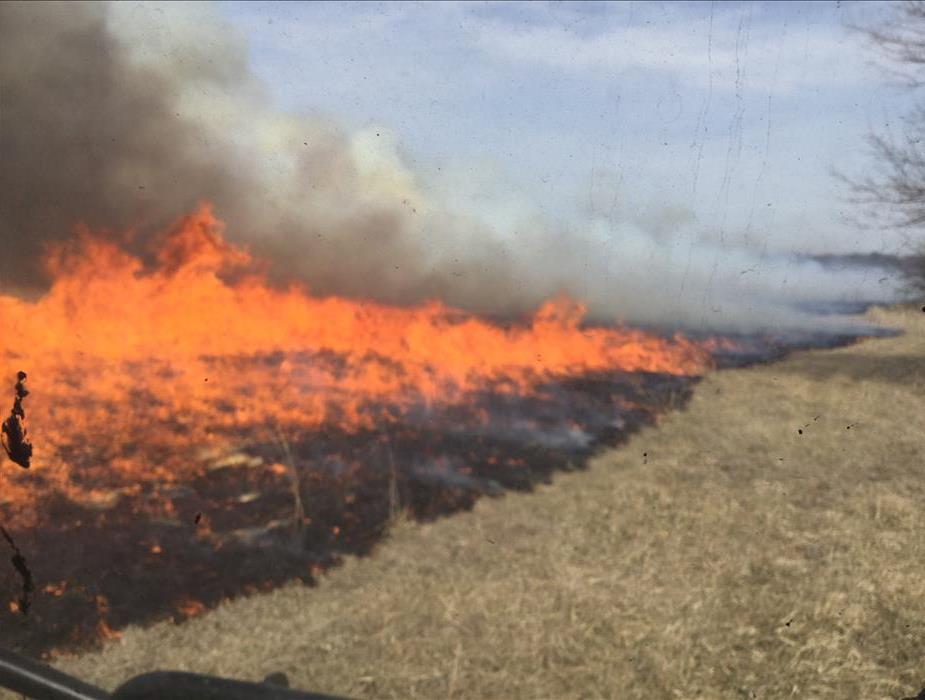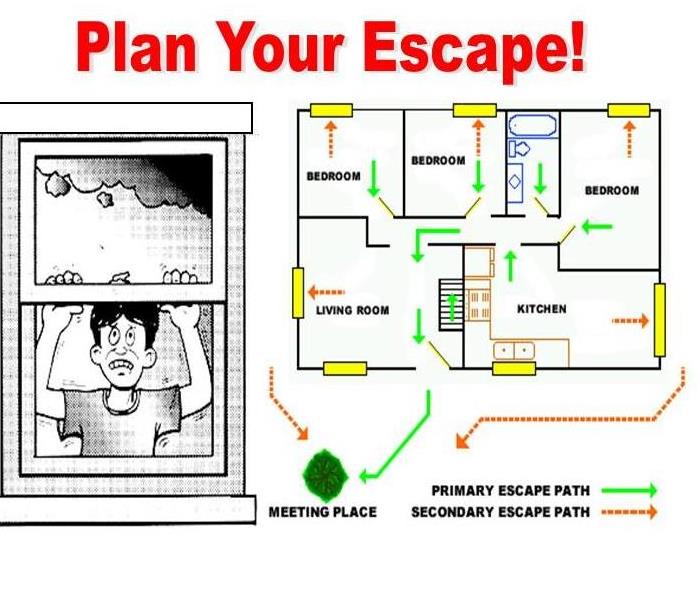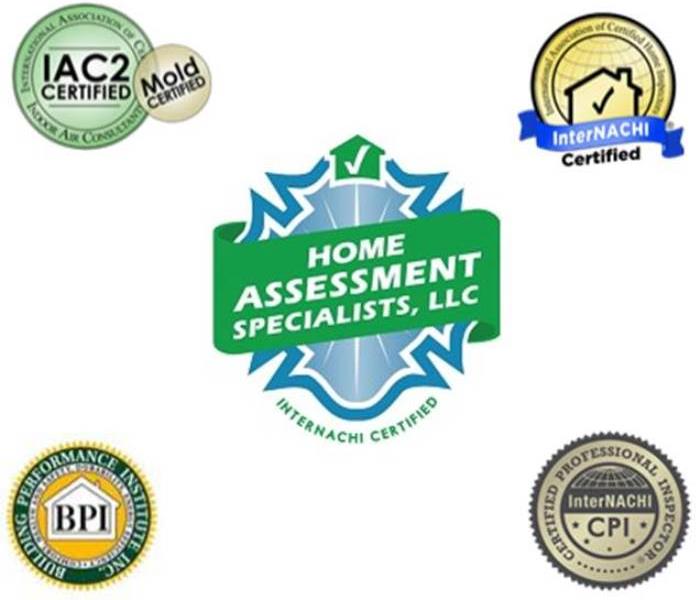Recent General Posts
Furnace Malfunctions -- Inspections and Prevention of Fires
9/25/2024 (Permalink)
SERVPRO® Tips for a Warm Winter
As everyone knows by know, we're looking at another polar vortex event this winter. Temperatures have already dropped to near record levels and are expected to go even lower in 2017. This is not the time to have your furnace decide to take a vacation.
After decades in the cleanup and restoration business, SERVPRO has developed checklists for homeowners and renters to use when inspecting their furnaces and HVACs (hopefully preventing malfunctions and other problems) when the weather turns a bit more extreme than usual, even for Illinois. Taking care of these items should keep you warm over the holidays and through the rest of winter.
Outdoor HVAC Inspections
• Clear all dirt, leaves, and other debris from the inside of the cabinet.
• Examine the drain pan to make sure it's clear. Remove any obstructions and debris.
• Check the evaporator coil and cabinet itself. Scrub them thoroughly.
• Inspect the exhaust blades and the fan motor for damage. If you have an older unit, it may require lubrication.
• Check the control box, all wiring and connections.
• Examine the compressor and linked tubing for damage.
Indoor Furnace/HVAC Inspections
• Examine and clean the blower assembly. This includes the motor, wheel, and housing.
• Inspect the blower housing for debris and clean.
• Check the condensate lines and pan; thoroughly clean.
• Wipe down and examine the burner assembly.
• Test the igniter controls.
• Check the air exchanger.
• Examine the outflow pipe; make sure it is properly attached to the furnace. Sections that show corrosion should be replaced.
• Check the control box, all wiring and connections.
• Replace the air filter.
• Examine the ductwork in the attic if you can. You can find leaks simply by feeling for airflow; there shouldn't be any.
The outflow pipe or flue is of particular importance when it comes to furnaces. If it is not securely connected to the furnace, there is always the chance of 'Blow Back.' SERVPRO strongly recommends to deal with this possible problem. When this happens, soot from the outflow pipe will blow into the house. The resulting contamination will need a visit from one of our response and restoration teams to clean the affected area just like after a fire. With proper maintenance, this 'Blow Back' is a needless expense and inconvenience.
With snow expected this weekend, now is the time to look over your furnace or HVAC before you find yourself with a flashlight and a garden trowel trying to remove ice or other debris from your outside unit. If you are a renter or just willing to admit you don't know anything about your furnace, make sure you call a professional furnace and HVAC maintenance company.
Remember to ask for their business license to operate in Illinois and photo ID before you let anyone in your home. For other storm damage that you may have to deal with this winter, call us at (815) 935-0077. SERVPRO of Kankakee County is here to help.
SERVPRO CONTINUING EDUCATION ONLINE CLASS FEBRUARY 2021
2/23/2021 (Permalink)
 SERVPRO ETHICS CLASS FEBRUARY 2021
SERVPRO ETHICS CLASS FEBRUARY 2021
Recently SERVPRO of Kankakee County, SERVPRO of Bloomington / Pontiac and SERVPRO of Champaign/Urbana hosted a Continuing Education live webinar for over 125 Insurance Agents, Brokers, CSR's and Adjusters.
Course Curriculum over a two day period entailed:
a) ETHICS and Professional Standards
b) FIRE DAMAGE
c) WATER DAMAGE
Insurance Professionals in Illinois are required by Law to complete 24-hours of insurance Continuing Education, including 3-hours of ethics are required every 2-year license term. The ethics CE requirement must be completed in an approved classroom or webinar course.
Our Moderator is Todd Davis, CIC. With over 25 years experience teaching professional continuing education classes and more than 40 years working in the industry as an agent, agency owner, and expert witness, our students find classes on topics such as ethics, laws, errors and omissions, sales, fire damage, water damage, mold and coverages informative and engaging.
Stop Brush Fires in Herscher and Essex
4/6/2020 (Permalink)
 Raging brushfire in Western Kankakee County
Raging brushfire in Western Kankakee County
It is that time of year when the fields are drying out after winter and it’s also the time when brush fires occur and sadly the majority of which are started carelessly. Please be sure to extinguish tobacco products before disposal. Find out your local ordinances in regards to burning leaves or yard waste. Don’t burn in windy or excessively conditions. If you do burn be sure to have water, extinguisher and shovel nearby. Our first responders will thank you.
JOB OPENING - CONTROLLER
2/24/2020 (Permalink)
 Join our team today!
Join our team today!
CONTROLLER Job Discription
*****Email resume to: BNichols@SERVPROKankakeeCounty.com
Position Summary / Purpose
Provide leadership and coordination of company financial planning, debt financing, and budget management functions. Ensure that company accounting procedures confirm to generally-accepted accounting principles.
Assist in managing the profitability and cash flow of the business that will assure the continued liquidity and growth of the company and the financial well-being of its stakeholders.
Primary Duties and Responsibilities
- Direct and coordinate the company financial planning and budget management functions
- Manage the preparation of financial reports and forecasts
- Monitor and analyze monthly operating results against budget
- Oversee daily operations of the Finance department
- Design the organization structure for the Finance department, staff positions with qualified employees, and continually train and develop employees in order to effectively accomplish the department’s goals and objectives
- Ensure compliance with local, state/provincial, and federal reporting requirements
- Work with other department managers, executives, and owners to develop and execute the strategic plan
- Direct and coordinate debt financing and debt service payments with external agencies
- Direct financial planning, procurement, and investment of funds
- Recommend benchmarks for measuring the financial and operating performance of departments and divisions
- Direct financial audits and provide recommendations for process and procedure improvements
- Determination of depreciation rates to apply to company capital assets
- Establish and implement short and long-range departmental objectives, policies, and operating procedures
- Advise owners / management regarding property and liability insurance coverage needs
- Accurately prepare and file required tax forms
Additional Duties and Responsibilities
- Assist in collecting overdue receivables
- Represent the company to external media, funding agencies, government agencies, and the general public
- Provide accounting policy orientation for new staff
Decision Rights and Authority
- Hiring, development, and termination decisions for finance department employees
- Creation of financial forecast and budget portion of strategic plan based on input from owners and department managers
- Determine when borrowing from existing line of credit is required
Working Relationships and Scope
- Regular communication with owner(s) and CEO regarding company performance and strategic issues
- Maintain communications and relationship with banking and lending organizations.
- Coordination with all department managers regarding budgets, operating performance, and strategic direction.
Performance Competencies
- Integrity–Ironclad. Does not cut corners. Puts the interests of the business above self. Earns trust of co-workers. Intellectually honest, doesn’t play games.
- Oral Communication–The individual speaks clearly and persuasively in positive or negative situations. Effective in one-on-one, small groups, and in public speaking contexts. Adaptable and able to think on his / her feet. Demonstrates a command of the language. Easily articulates ideas and standards.
- Written Communication–Writes clear, precise, well organized letters, proposals, and emails. Uses proper grammar and punctuation. Demonstrates appropriate vocabulary and correct word usage.
- Team Building–Achieves cohesion and effective team spirit with subordinates. Ability to motivate teams to produce quality output within tight timeframes and to simultaneously manage multiple projects. Sustains a climate characterized by open, honest relationships where differences are constructively addressed rather than ignored, suppressed, or denied. Treats subordinates fairly and shares credit.
- Sound Judgment and Decision Making–Demonstrates consistent logic, rationality, and objectivity in decision making. Driven by the financial well-being of the business and its stakeholders
- Planning and Organizing–Plans, organizes, schedules and budgets in an efficient, productive manner. Effectively contributes to the long-range planning activities. Focuses on key priorities. Pays attention to details. Manages personal time well.
- Money Management–Demonstrates sound fiscal habits. Employs a disciplined approach to spending. Tracks expenditures. Works from a budget.
- Excellence–Sets high, ‘stretch’, standards of performance for him / her self and their organization. Demonstrates low tolerance for mediocrity. Encourages individual initiative. Maintains a level of intensity sufficient to achieve long-range goals.
- Technology–the individual uses typical communication devices to effectively speed communication and appropriately utilizes company-approved estimating, customer contact management, and standard word processing and spreadsheet software tools to enhance efficiency and accuracy of work performed.
Qualifications-Knowledge, Skills, and Abilities
Bachelor’s degree in accounting, business or related field plus CPA certification. (MBA or Master’s degree in finance or accounting is preferred but not required). Minimum of seven (7) years of experience in senior-level accounting or finance positions with similar sized and larger organizations.
- Finance, Accounting, Budgeting, and Cost Control
Extensive knowledge of the principles and concepts and significant experience in these areas – including generally accepted accounting principles. Knowledge of federal and state/provincial financial regulations. Ability to analyze financial data, prepare financial reports, statements, and projections. Working knowledge of short and long-term budgeting and forecasting.
Proven ability to identify clear opportunities and threats. Accurately assesses the company’s strengths and vulnerabilities. Comprehends the big picture.
Possesses strong mathematical skills. Able to quickly compute rate, ratio, and percentages and to interpret financial reports, analyze performance changes and trends. Recognizes inconsistencies across multiple reports and sets of data.
- Constructive Confrontation
Has the ability to solicit, process, and integrate inputs and ideas from subordinates, peers, and executives. Recognizes areas of conflict or disagreement and deals with them through open and honest dialogue. Effectively provides feedback. Willing to stand their ground based on sound principles and experience, in the face of opposition by owners and other executives.
Knowledge of automated financial and accounting reporting systems. Effectively operates accounting software (e.g. QuickBooks, Peachtree) and understands how to make changes to ledgers, accounts, and reports to reflect the needs of the business.
- Computers and Electronic Technology
Demonstrates intermediate to advanced skill in the use of computers, the internet, PDAs, and other digital technology specific to the job as well as MS Word, Excel, and other industry-specific software.
Physical Demands
The physical demands described below are representative of those that must be met to successfully perform the essential functions of this job. Reasonable accommodations may be made to enable individuals with disabilities to perform the essential functions.
While performing the duties of this job, the employee is regularly required to sit, use hands to finger, handle or feel, reach with hands and arms, and talk or hear. The employee is frequently to stand and walk. The employee must regularly lift and / or move up to 10 pounds.
Working Conditions
- Controller’s work is typically carried out in an office environment. Occasionally traveling to and meeting with customers and clients at their facilities is required.
- Noise level in the work environment is usually quiet.
***Email resume to: BNichols@SERVPROKankakeeCounty.com
Farm Fire Safety
6/24/2019 (Permalink)
 Farm Fire Safety Electrical Safety Checklist
Farm Fire Safety Electrical Safety Checklist
Barn fires are the farm owner’s worst nightmare. Most have tragic results whether it’s the loss of human life, an animal, valuable equipment or the building structure itself. The majority of all barn fires are the result of carelessness and lack of fire safety knowledge. Insurance statistics show that the two most common times of the year for barn fires are winter and summer . Winter fires are caused by appliances, rodents chewing through wires or the accumulation of dust or cobwebs on electrical surfaces. Summer fires are often the result of electrical storms or spontaneous combustion of hot hay. Farm owners and managers should take the following precautions to help reduce the incidence of fires.
1. Are all farmstead electrical systems free of corrosion?
2. Are all electrical panels readily accessible and clearly labeled?
3. Do all electrical cables and conduit’s enter boxes from the side or bottom?
4. Is all electrical equipment equipped with a separate grounding conductor?
5. Are all lighting fixtures of an enclosed, gasketed, watertight and non-corrosive design?
6. Is a UL approved Lightning protection system in place in all buildings, silos, etc?
7. Are all buildings free of damaged or chewed wiring and conduit?
8. Is the use of extension cords kept to a minimum? When an extension cord is needed, either a heavy duty (Type S), grounded cord or equivalent should be used.
9. Are all motors equipped with a properly sized fused disconnect or circuit breaker located within sight of and within ten (10) feet of the motor?
10. Are all motors are they totally enclosed, farm service duty design rated for continuous operation?
11. To all heat lamps have cords short enough to prevent contact between the heat lamp and floor without first becoming unplugged, are installed in porcelain sockets and are supported by chains?
When a fire breaks out in a house or a farm building, everyone must be evacuated from the building. Normal exits may be blocked; therefore, it is compulsory that emergency exits exist. Once everyone is out of the building, call the fire department. Give your name, address, and the exact location of the fire. I have the person you were talking to repeat your information. Never allow anyone to re-enter a burning building.
Electrical Home Safety
5/13/2019 (Permalink)
 Electrical Safety
Electrical Safety
Flipping a light switch. Plugging in a coffee maker. Charging a laptop computer. These are second nature for most of us. Electricity makes our lives easier. However, we need to be cautious and keep safety in mind.
Here are some safety tips courtesy of the National Fire Protection Association.
1. Have all electrical work done by a qualified electrician.
2. When you are buying or remodeling a home, have it inspected by a qualified private inspector or in accordance with local requirements.
3. Only use one heat producing appliances such as a coffee maker, toaster, space heater, etc. plugged into a receptacle outlet at a time.
4. Major appliances such as refrigerators, dryers, washers, stoves, air-conditioners, microwave ovens, etc. should be plugged directly into a wall receptacle outlet. Extension cords and plug strips should not be used.
5. Arc – fault circuit interrupters (AFCI’s). These shut off electricity when a dangerous condition occurs. Consider having them installed in your home.
6. Use ground – fault circuit interrupters (GFCIs). These reduce the risk of shock they shut off an electrical circuit when it becomes a shock hazard. They should be installed inside the home in bathrooms, kitchen, garages and basements. All outdoor receptacles should be GFCI protected.
7. Testing ACFIs and GFCIs: Once a month according to the manufacturers recommendations. You do not need a flame to start a fire. Fire is can start when heat builds up near things that burn. This can happen when a hot lightbulb is near things that burn. Things such as cloth or paper, or a cord that has been placed under a carpet.
8. Use ground – fault circuit interrupters to reduce the risk of shock. These items shut off an electrical circuit when it becomes a shock hazard. They should be installed inside the home and bathrooms, kitchen, garages and basements. All outdoor receptacles should be GFCI protected.
9. Check electrical cords to make sure they are not running across doorways or under carpets. Extension cords are intended for temporary use. Have a qualified electrician add more receptacle outlets so you don’t have to use extension cords.
10. Use a lightbulb with the right number of watts. There should be a sticker that indicates the right number of watts.
IMPORTANT REMINDERS:
Call a qualified electrician or your landlord if you have:
Frequent problems with blowing fuses or tripping circuit breakers.
A tingling feeling when you touch an electrical appliance.
Discolored or warm wall outlets.
A burning or rubbery smell coming from an appliance.
Flickering or dimming lights.
Sparks from an outlet.
Household Escape Planning
4/5/2019 (Permalink)
 ESCAPE PLANNING
ESCAPE PLANNING
Plan Ahead!
If a fire breaks out in your home you may have only a few minutes to get out safely once the smoke alarm sounds. Everyone needs to know what to do and where to go if there is a fire.
SAFETY TIPS
1. Make a Home escape plan. Draw a map of your home showing all doors and windows. Discuss the plan with everyone in your home.
2. No at least two ways out of every room, if possible. Make sure all doors and windows leading outside open easily.
3. Have an outside meeting place like a tree, light pole, or mailbox. Make sure it is a safe distance from the home where everyone should meet.
4. Practice your home fire drill at night and during the day with everyone in your home at least twice a year.
5. Practice using different ways out.
6. Teach children how to escape on their own in case you can’t help them.
7. Close doors behind you as you leave.
IF THE ALARM SOUNDS...
1. If the smoke alarm sounds get out and stay out! Never go back inside for people or pets.
2. If you have to escape through spoke, get low and go under the smoke to your way out.
3. Call the fire department from outside your home.
FACTS
! A closed door may show with the spread of smoke, heat and fire. Install smoke alarms inside every sleeping room and outside each sleeps area. Install alarms on every level of the home. Smoke alarms should be interconnected. When one smoke alarm sounds, they all sound.
! According to an NFPA survey, Only one of three American households have actually developed and practiced a home fire escape plan.
! While 71% of Americans have an escape plan in case of a fire, only 47% of those have practiced it.
! 1/3 of American households call made an estimate thought they would have at least six minutes before a fire in their own home would become life-threatening. The time available is often less. And only 8% set their first thought on hearing a smoke alarm would be to get out.
SERVPRO is hiring for construction
2/28/2018 (Permalink)
SERVPRO is hiring for construction.
- Job qualifications must include the following per building code regulations:
- Install Doors and Windows
- Install Kitchen Cabinets and Countertops
- Install casing and baseboards with mitered corners and 45 degree angles.
- Must be able to know how to operate saws and basic handheld power tools and have general construction skills
- Must have a valid drivers license
Please send resumes to: Construction@SERVPROkankakeecounty.comor stop in at the office to fill out an application or drop off a resume: 1725 N. Boudreau Rd Manteno
I Am Your SERVPRO Rep
3/13/2017 (Permalink)
Who Am I?
I am your SERVPRO of Kankakee County rep. When I stop in, feel free to ask about SERVPRO services, hobbies, tell me a joke, or just chit chat for a little while. I look forward to getting to know you!
Who is SERVPRO?
*SERVPRO began as a painting business in Sacramento, CA in 1967 by Ted and Doris Isaacson.
*The first SERVPRO Franchise was sold in 1969.
*Bristol-Myers Domesticare Division and its 175 Franchises were acquired in 1979.
*SERVPRO relocated the corporate headquarters from Sacramento to Gallatin, TN in 1988 and consisted of 647 Franchises.
*In 1991 the Nashville Business Journal named SERVPRO the Small Business of the Year.
*In 2000, SERVPRO sold its 1,000th Franchise.
*SERVPRO moved to a 140,000 square-foot, state-of-the-art facility in Gallatin in 2005 to provide more room for expansion.
*Now, with more than 1,700 Franchises are operating nationwide, and SERVPRO continues to grow.
*SERVPRO works closely with insurance agents, property managers, and local fire/police departments to assist in any community disaster.
*SERVPRO of Kankakee County is ranked at Top 50 SERVPRO Franchise and Large Loss Certified as a Disaster Response Team. We have the capability and staff to help in any size disaster and available 24 Hours a Day!
What Does SERVPRO of Kankakee County Do?
We offer a variety of restoration and remediation services including:
*Water Damage Restoration and Dehumidification
*Fire Damage Restoration including fire, smoke and soot
*Mold Mitigation and Remediation
*Storm Damage Restoration
*24 hour Board-up Services for fires, vandalism, and other emergencies
*Cleaning Services including carpets, tiles, upholstery, sewage, biohazard, and deodorization
*Contents Claim Inventory Service
*Document Drying
“Like it never even happened.”
Contact us 24 hours a day at 815-935-0077!
Semi-Annual C. E. (Continuing Education) Coming Soon
7/20/2016 (Permalink)
 Up-Coming C.E. Classes Registration Form from SERVPRO of Kankakee County
Up-Coming C.E. Classes Registration Form from SERVPRO of Kankakee County
SERVPRO of Kankakee County to Host C. E. Class
One of the ways we give back to our local communities is to offer free continuing education classes to our local insurance agents. Since we are group owned SERVPRO franchises comprising of three separate branches, we can reach out and assistance a large area audience of insurance agents. We believe that knowledge is power, and just as we are well trained and educated in our fields of expertise culminating in exceptional service, we can assist others to improve their knowledge and performance.
As shown in the insert to the right, these Two Continuing Education Classes will be held on consecutive days towards the end of September 2016. Click on this link for direct access to an application. Todd Davis, one of SERVPRO Corporate instructors, taught the two classes during the last Spring session. SERVPRO of Kankakee County will be one of the local franchises to contribute a free breakfast and a free lunch to all the participants. Like us on Facebook: https://www.facebook.com/SERVPROK3/posts/1351443434869267. The required Ethics Class will be followed by our revolving informational subjects; this class is "Understand Mold in the Restoration Industry.” Mold remediation in Bourbonnais can be a sticky wicket for both insurance agents, homeowners, and our highly trained AMRT, Applied Microbial Remediation Technicians. Knowing how to deal with mold infestations can limit liabilities and costs while ensuring mitigation from any health effects and protecting our residents.
Consider SERVPRO of Kankakee County as a partner in keeping our communities safe following any fire, water, or mold problems. Contact us for registration for the C.E. Classes or help with your home or business. (815) 935-0077
In Memory of Fire Chief Ross C. Butzow
5/18/2016 (Permalink)
 The late Ross C. Butzow, Chief of Wellington-Greer Fire Department (retired) and community leader.
The late Ross C. Butzow, Chief of Wellington-Greer Fire Department (retired) and community leader.
Our thoughts and prayers are with the Butzow family in their loss.
Ross was dedicated to his profession as Fire Chief and a wonderful husband and father. He will be greatly missed in the community and the MABAS 37 family.
http://www.anderson-funeral-home.com/obituaries/Ross-Butzow/#!/Obituary
Memorials honoring Ross may be made to the Wellington-Greef Fire Department, P.O. box 143, Wellington, IL 60673.
HAS – Home Assessment Specialists
5/17/2014 (Permalink)
HAS – Home Assessment Specialists – Home / Mold Inspections and more
Kris Pagliaro, CPI – (708) 465-8040





 24/7 Emergency Service
24/7 Emergency Service








